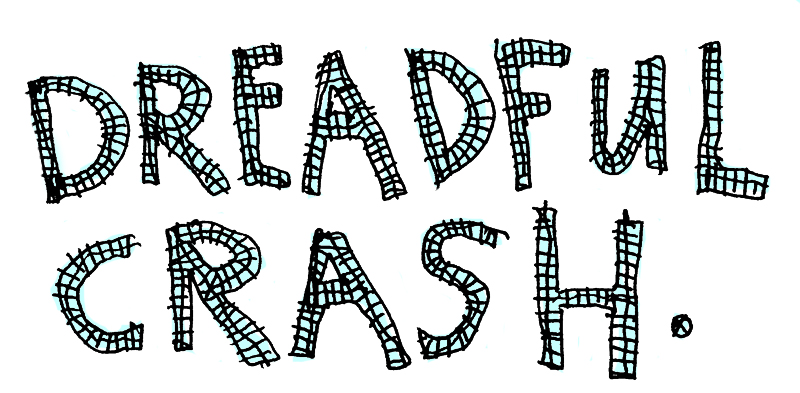
GENE
First day of July I was thumbing the Caneville Road. I’d walked off another of Brother’s clean-up jobs, mine sludge up to my pant pockets, throat raw, hands itching and broke out. For eight dollars an hour I told him I couldn’t do it. Told him I’d walk back to Canard. He didn’t like it and called me an ugly name, but I told him I’d make it up to him, and at the time I thought I would.
I got my first ride from a black-headed man in a Chevy pickup. He set me out at the Caneville bridge, and I stood there a good while, ’til a heavyset preacher picked me up, but he got a flat before we got to Pic-Pac and had to call his wife to bring the spare, so I went in Pic-Pac and got me a Popsicle, come out, started walking. I’d walked a half mile, I guess, when a fellow stopped, kind of had the crazy eye, so I told him I’d just wait, and he gunned his silver Buick across the double yellow line into a red Ford heading the other way. When the Buick hit him, the Ford flipped up on his side against the rock wall, and the Buick skidded down the ditchline toward Canard a hundred yards and hung up on a road sign, front wheels spinning, no skid mark in sight.
Such as that was common in oh-four, what with them pain pills pouring down like February snow. Same year one died in a bathtub dry and blue as a pool chalk. Another they found dead in the sewer ditch they was digging in front of the Frawley Headstart. A lady’s heart give out, a needle in her arm back of the Christian Church, and a teacher died at Kettle Creek School snorting a pill off her desk in front of a room full of kids. All that just in Canard County. In a single year.
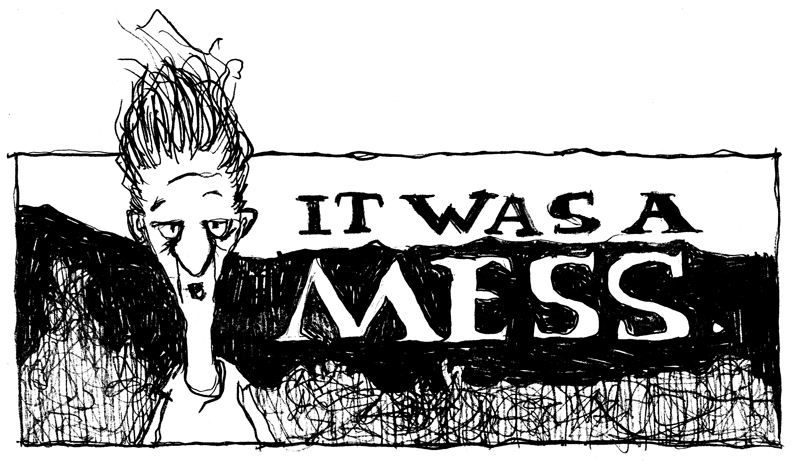
When you’re first one at a wreck, you can’t believe how quiet it is. They was a woman had hair dyed orange come hollering out of the sideways Ford, but even still it felt too quiet. No police nor ambulance. Just you and what happened. A man with a winch on his truck come up, had a hat said “Blackbird VFD,” and he went to work getting that Ford set down. Then next, a lady in her hospital scrubs stopped, tried to see to that screaming woman. After that, people gathered from every side—come out of their houses to say they seen it, cars lined up down both sides of the road full of people wanting to see could they help, a man running for magistrate handing out cards. Pretty soon they was so many people congregating, felt like you was at a yard sale. One woman stopped to ask if anybody was selling baby clothes, but when the ambulance pulled up and she seen it was a wreck, she started to cry, and I told her not to feel bad, told her I thought the very same thing.
When she settled down, I walked back to the Buick. When I got there, they was several people crowded around, and I could barely see the driver the way the Buick was reared back on that road sign. I stood up on my tiptoes, and I seen the man stir. He was staring out the windshield at the white summer sky.
Somebody said, “You gonna make it, buddy?”
The man in the Buick leaned over on his elbow towards us, mouth hanging open, whole face white as the sky. He opened his eyes wider, ’til they was like two bowling balls coming down the alley at us. And then he shook his head back and forth and said, “Nope.”
Then he lay his head down on the car seat and didn’t move no more.
Somebody said, “Did he die?” and I turned to see who it was and that right there was the first time I seen June. God, she was good-looking, and in the months to come, she would be so good to me. I fell in love with her on the spot, and for various reasons, I got to where I couldn’t bear to say her name. I just call her That Woman.
That Woman stood there with a big tall girl, her niece, name of Dawn. When I didn’t answer June about the man dying, Dawn said, “Say,” and where she said it so hateful, all I could do was stand there and look at her big wild head of hair.
DAWN
“Say,” I said, and Gene didn’t say a thing. He just stood there, his arms brown as bread, covered in gray mud, every other finger mashed up. He smelled like he’d bathed in lighter fluid and looked like he’d been drug through the landfill. He turned to us, eyes all misty. I thought he was fixing to cry.
I said, “You fixing to cry?”
Aunt June told me to hush. I was sorry for that man being dead, and I shouldn’t have been hateful to Gene, but I was in a terrible mood. It was too hot to be married, but I surely was. I had my little girl Nicolette strapped in the car and Aunt June’s yellow dog Pharaoh pulling at the leash. My husband Willett hadn’t turned out like I hoped and I had moved to Tennessee for him and now this Gene was gawking at Aunt June, and they was dead people scattered all over, and it was too much. I’ll just be honest.
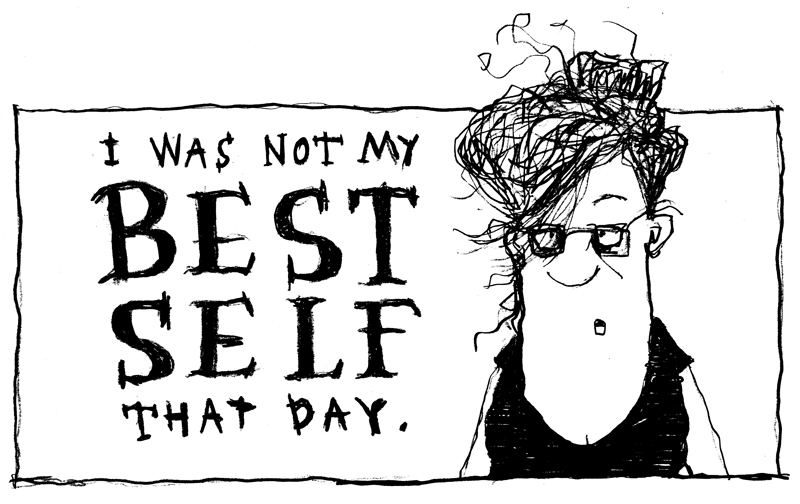
Gene walked with us back to June’s car.
“If I’d rode with him,” Gene said, “this might not’ve happened.”
I said, “Or you’d be dead too.”
“I’m Gene,” Gene said to Aunt June.
“Hello, Gene,” Aunt June said.
Pharoah barked.
“She’ll bite you,” Nicolette said to Gene. Nicolette was three.
Gene put his hand down to Pharoah’s mouth. Pharoah raised her lip.
“That’s a good dog,” Gene said.
June looked off at the Ford. The orange-headed woman standing beside it was screaming, “Save my baby. You got to save her.” A woman in hospital scrubs had her arm around the oranged-headed woman. A truck winched the Ford back down onto the road.
“How’d you get here?” Nicolette said to Gene. “Where’s your car?”
“Aint got nary,” Gene said.
“You need a ride?” June said. June loved a project. She loved saving stuff.
I loved it when it rained and everybody stayed home.
Gene moved to get in the car. Then he stopped and spoke.
Gene
“I don’t know you want me in your vehicle,” I said. “I ain’t what you call fresh.”
That Woman said, “We aint that fresh ourselves.”
Niece Dawn said, “What’s that all over your pants?”
“That’s from helping Brother clean tanks,” I said.
“What tanks?” Dawn said.
“Army tanks,” the little girl said.
“Tanks held coal float,” I said.
Dawn made a face like she’d opened something spoiled, looked at That Woman.
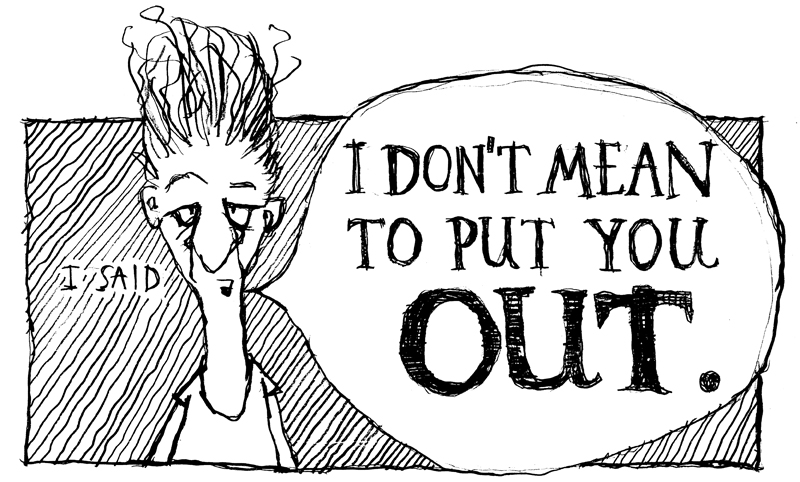
That Woman spoke to her niece a minute and then That Woman took the dog and the little girl and Dawn opened the trunk, and pulled out painter dropcloth plastic, started spreading it in the front seat. A Dabble County Sheriff’s cruiser pulled up and a deputy got out, asked questions of the people gathered, must have been fifty by then. Out the side of my eye, I seen the woman in the hospital scrubs pointing at me. That deputy come over and asked had I seen it, and I said I had. He asked me what I seen and I told him and he stopped writing in his little book, folded it up, said, “Now, what was it you was doing out here?” and then he looked me up and down like there might be something to find out about me, but there wasn’t. I was just walking off a bad job like anybody with the least regard for theirselves would, and I don’t know what I said to that deputy exactly, but he leaned his head forward like somehow I had some part in that bloody mess.
About then, That Woman said, “You holler when y’all are done, Gene. Holler when you’re ready to go. We’ll be waiting for you.” When that deputy looked at That Woman, she leaned over, picked up that little girl and moved that dog leash to her other hand, said, “We’ll be fine.”
The deputy flipped back through his notebook, said, “So I can get ahold of you at this number,” and turned the notebook towards me, showed me the number at Sister’s house. I said he could. He nodded and I said, “It’s OK for me to go?”
He looked at me, waved his hand had the little book in it, said I could go.
DAWN
You had to be hemmed up in the same vehicle with Gene to really appreciate how bad he smelled.
“Stop rubbing your nose,” I said to Nicolette. We were sitting in the back seat with the dog. Gene and June were up front.
“I caint,” Nicolette said.
“Yeah, you can,” I said, and set her hand down in her lap.
“What’s this?” Gene said. He turned, reached across the seat, and held a piece of glass up between me and Nicolette.
“Where’d you get that?” Nicolette said.
“Off the road,” Gene said.
The glass was blue-green clear, like old pop bottles, and it was rubbed smooth, like water had been running over it, like it had been somewhere it could tumble. Glass going back to sand.
“Can she have it?” Gene said to me.
“I reckon,” I said.
Gene reached the glass to Nicolette. She closed her hand around it, and then dropped it out the window. June didn’t see it. Gene didn’t say anything. Nicolette grinned like a half-shucked ear of corn.
“Where you going, Gene?” Aunt June said.
“I’m staying at Sister’s,” he said. “My sister’s.”
Pharoah growled. Gene looked back at her.
“Be careful with her,” June said. “She’s liable to bite.”
Gene stared at Pharoah. He had a face like desert rocks in a cowboy movie.
“That’s a good dog right there,” he said. “She’s looking after you. That’s what makes her growl.”
I looked at Pharoah. She was a sweet yellow dog, but crazy as a bedbug.
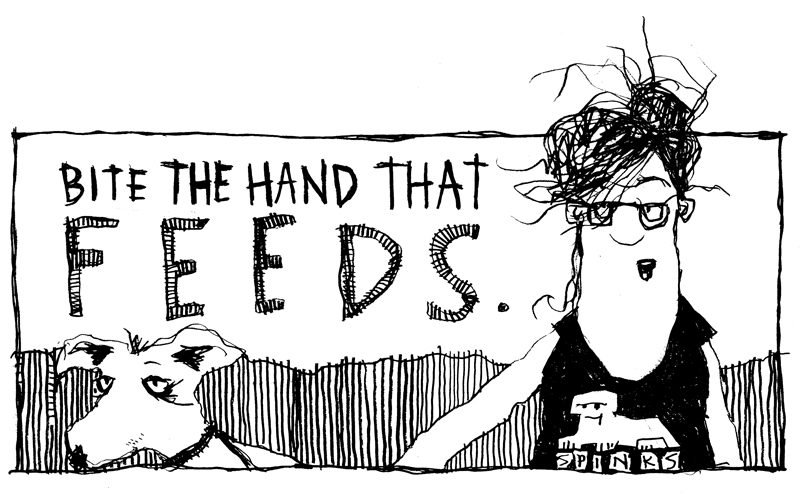
“What’s that on your face?” Nicolette said.
Gene put his hand to the cinched-up black spot on his cheek said, “That’s where they cut off my hairy spot. Said it had the cancer. Where I’m out in the sun so much.”
June’s eyes filled the rearview.
Gene said, “Something like that make you appreciate.” His eyes stayed on us, blinking like somebody was squirting water in his face.
“How can you sit turned around like that?” I said. “Makes me carsick.”
Gene put his hand to Pharoah. She laid her ears down, and he scratched between them. “Does me too,” he said.
I turned and looked out the car window at a cornfield, at a yard full of scrap lumber and rusted car tops, at the hillsides so full of green they looked almost blue. There was a lot to appreciate. I wished I could.
GENE
It was nice in That Woman’s car. I was glad the coal sludge ruined my smokes so I couldn’t light up. But I needed me a smoke. I was thinking of that dead man, that screaming woman and her baby.
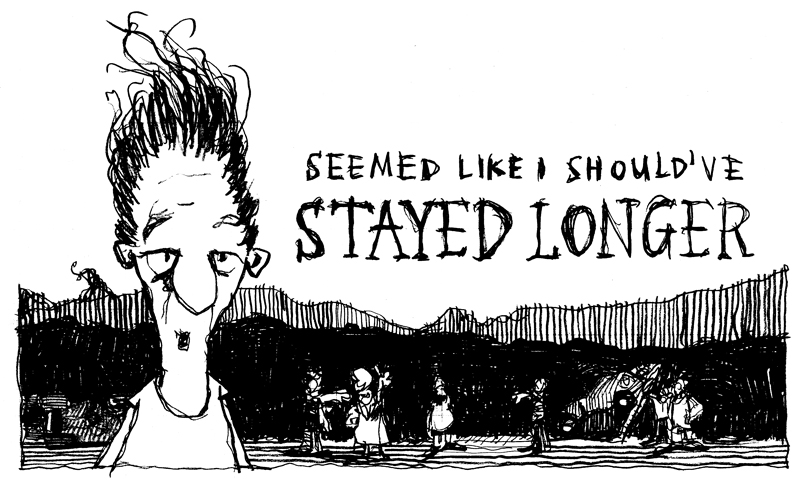
That Woman said, “Does your sister live in town?”
I said, “She lives in the green house next to Lawyer Dan.”
That Woman nodded. “That’s where you want to go?” she said.
“Yeah,” I said. “I stay in the little house out back.”
The yellow dog licked itself.
“That dog might need to go to the bathroom,” I said.
“She was just out,” That Woman said, and pulled the car over to the side of the road.
The little girl said, “Mommy, I want my piece of glass back.”
Dawn said, “Little late for that.”
Little girl said, “Help me find it.”
That Woman hunted something in the floorboard. The dog fidgeted and grunted like this: Unh unh unh unh unh.
That Woman said, “I can’t find my phone.”
I said, “You want me to walk that dog a little bit?”
She said, “Gene, yes, I would,” and, boy, that felt good to hear her call my name. Like somebody scratching between my ears.
The back door hung open where Dawn and her little girl had got out. They rummaged down the side of the road in the gravel. The dog sat there, head pulled forward. I got ahold of its leash. Dog raised its lip. I said, “Come on, Old Yeller, let’s me and you sniff this place out.” The dog come down out of the car. We got off in the grass, and she cut loose with the waterworks. I said to her,
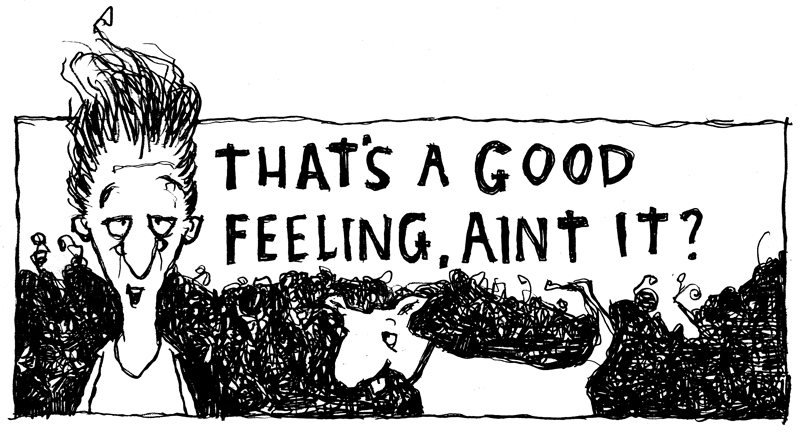
But by then she was nosing in the gravel, trying to make her own sense of the world.
DAWN
Aunt June didn’t care much for air conditioning. She liked to keep things natural, so all the way to Canard the air whipped around through that Honda and all our stinks got mixed up together—mine, Nicolette’s, Pharoah’s, June’s, and Gene’s.
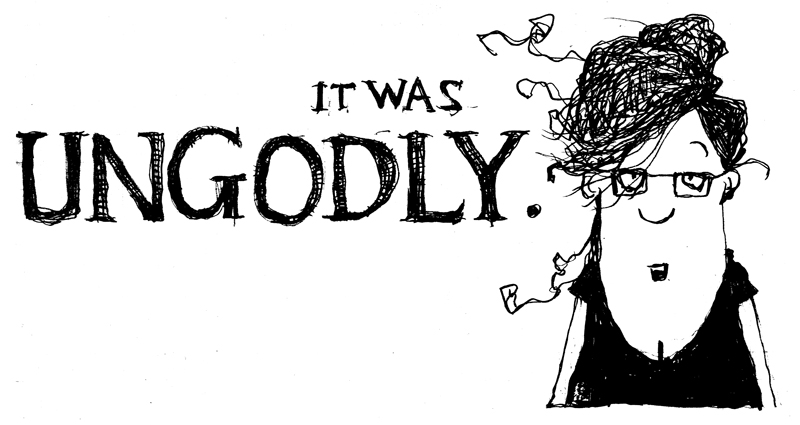
On the way home, Gene filled June up with stories of all the yards he had ever mowed, stories more tedious than my husband’s stories of his pimples and bowel movements, more tedious than him telling me his dreams every morning and the plots of his comic books every night. Gene’s weedeater stories about gas-and-oil ratios and how to keep grass clippings off people’s porches and how he learned to tell the difference between weeds and stuff people had planted on purpose went on without end, and by the time we’d got back to Canard, June had him mowing my mother’s yard.
When we finally got to the foot of the hill in front of Momma’s house, Gene was going on about mowing over a nest of yellowjackets and I said to him,
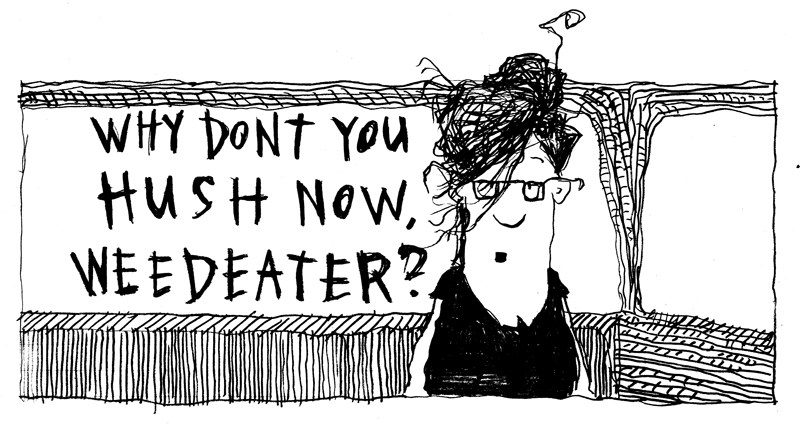
Mamaw’s Escort was parked on the street in front of us, on the other side of Momma’s steps. Mamaw got out, said, “Our Savior, arrived at last.”
June sat both hands on her steering wheel, said, “I can’t believe she’s still driving that thing.”
Mamaw came over and stood to where June couldn’t open the car door without hitting her. Me and Pharoah got out and stood in the street while Nicolette got herself loose from her car seat. “Do it myself,” were Nicolette’s first words and she’d said them ever day since. Mamaw’s eyes fixed on Weedeater who couldn’t get loose where June had the Honda jammed up against the bank. He’d got his shoulders above the top of the door, but his feet had got tangled up in all that plastic June lay down for him to sit on.
“Mamaw!” Nicolette hollered and ran to who was really my mamaw. Nicolette’s real mamaw—my mother—had not been around enough in the past three years for Nicolette to name her. She just called her Tricia or Trish, which is her name—Tricia Redding Jewell.
Weedeater finally got out and stood on the sidewalk above the bank. He squinted up at Momma’s house, which was at the top of seventy-three concrete steps, seventy-three steps pretty much straight up a hillside in downtown Canard.
“Some yard,” Weedeater said.
“Who’s this?” Mamaw said, standing close to June looking into the side of her head.
Nicolette looked at June like Mamaw was talking about some creature living inside June’s ear. I tapped Nicolette’s shoulder. She tilted her face up at me.
“She’s talking about him,” I said, pointing at Weedeater.
Nicolette looked at Weedeater, looked at June, then shot over to Mamaw and gave her a hug that might’ve knocked over some. “Aint that something?” Mamaw said.
“I got to pee,” Nicolette said.
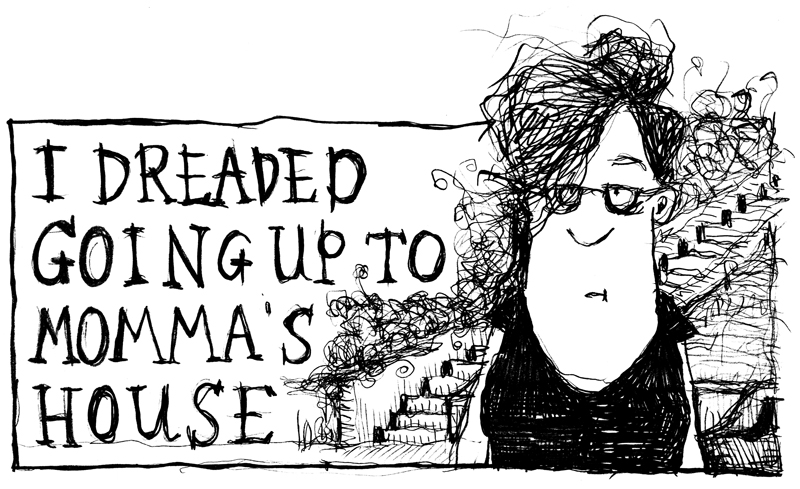
GENE
Me and that parade of women headed up the steps and by the top I would have eat that baby for a smoke. I was winded. But That Woman’s mother, they called her Cora, wadn’t even drawing hard when we got to the top. She was built like a roll of rabbit wire and didn’t weigh much more.
“God Almighty,” Cora said from the screened-in porch. The rest of us strung down the steps, me and Dawn furthest down, looking out over town. That Woman said, “What, Momma,” and at the top we seen what.
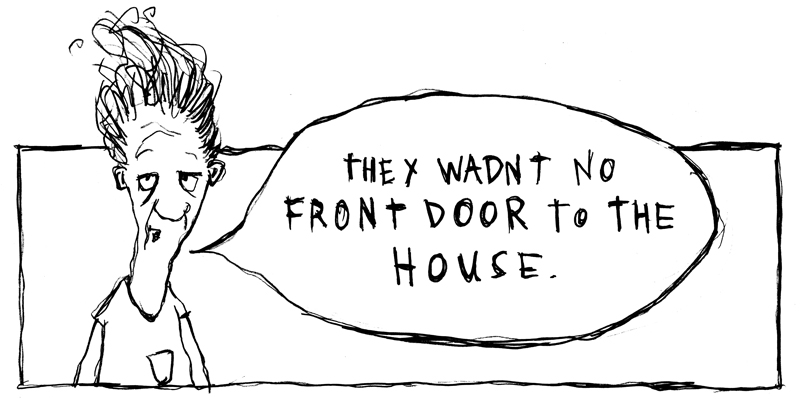
It was as nice a house as I’d seen without a front door. It had big high ceilings and walls smooth with plaster. I don’t think they was a single chunk of drywall in the whole place. It was plain inside, no duct work or drop ceilings. It felt old. But it was a trashy mess—piles of food trash in the living room, clothes strewn, mail strewn. They was a line of sticky drips on the floor from the front door to a commode straight in front of you against the back of the house. I tramped through there, trying not to kick the cans, the bottles, the shot-off fireworks, on my way to the bathroom. Once in there and going, I was afraid my pee would knock the commode through the floor. That commode was one of many things not secure in that place.
When I come out of the restroom, Evie Bright stood in the door like it was our fault she didn’t have wind enough to get up the steps.
DAWN
“God Almighty,” Evie said. “There aint no point to that.”
I asked her what happened to Momma’s door. Evie was my age, but her and Momma partied together.
“I don’t know,” Evie said. “Somebody took it.”
“Took a door?” I said.
“I don’t know, Dawn,” Evie said. “How would I know? I’m not the door-woman. You want to know where the door is, come home and watch the door. Caint see the door from Tennessee, can you? Caint keep an eye on the door from there.”
I walked off. You can’t talk to high people.
“Where’s Tricia?” Evie said to Mamaw.
“Not here,” Mamaw said.
“She’s ’sposed to be here,” Evie said.
Mamaw pushed a spraypaint can into a pile of clothes with her toe and shrugged.
“You gonna let us in your college class, June?” Evie said. “I aint going to lie to you. I need the money.”
June was teaching a summer art class at the community college. She’d got a grant to pay the students who took it.
June said, “Yes, Evie. Of course.”
“Starts Wednesday, right?” Evie said.
“Yes,” June said. “No. It starts this coming Tuesday.”
Evie said, “I’ll be there Wednesday.”
Talking to Evie was like somebody emptying a nail gun into the side of your head. I said, “You don’t need to take that class, Evie. That class is for people who give a shit.”
“Why do you care then?” Evie said.
I headed to the kitchen.
“Tricia’s taking it,” Evie said.
June said, “Taking what?”
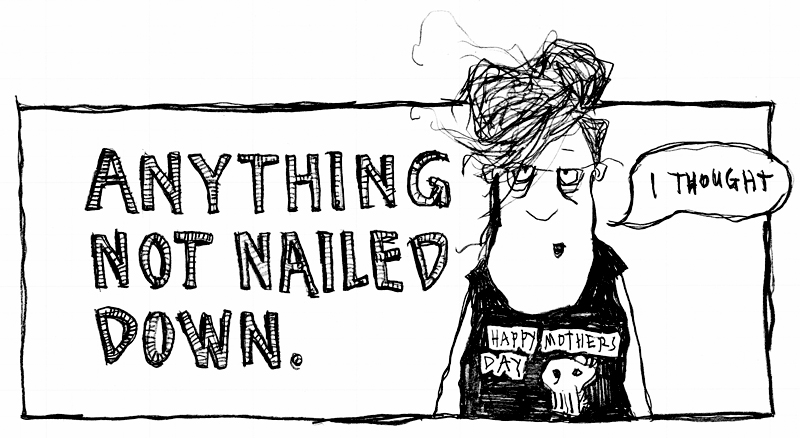
“Your class,” Evie said.
That summer Momma and Evie’s shame was so gone you couldn’t have found it with a pack of them big-eared dogs from prison movies. Momma and Evie could have cared less how it would make June feel for them to fart around in her summer class, how it might knock out somebody who might actually want to be in there.
I went upstairs.
GENE
That banty-rooster girl Evie said, “Who are you?” and I said, “Nobody,” cause she come at me like a wad of yellowjackets, and caught me blank.
She said, “I can’t say you aint.” Then she was gone, quick as she come, and that old woman, Cora, looked at me and said, “Now, whose are you?” I told her who my daddy was and she said, “Why you here?” and when I pointed at That Woman, Cora said, “Yeah, I seen you get out of her car, but why have you come here?”
I said, “To mow the yard.”
Cora said, “Well, that aint nothing to be ashamed of, is it?” She looked at Nicolette when she said it.
Nicolette said, “I don’t reckon.”
I’ll just say it—the whole bunch made me nervous. I come from some ruckus-making people, so I generally try to avoid stir in strangers, and if it was most people, I’d have just cut the grass and not said nothing to none of them, just gone to That Woman for my pay when I was done. But That Woman now, she was a bug zapper and I was the bug. I couldn’t stay away from her nor nothing swirling in the area around her.
Cora said, “What are you looking at June for?”
I pulled my mouth shut and said I didn’t know.
Cora said, “Come with me.” We went through the kitchen to the back door. She took me out in the yard, said, “Is that all you do is mow?”
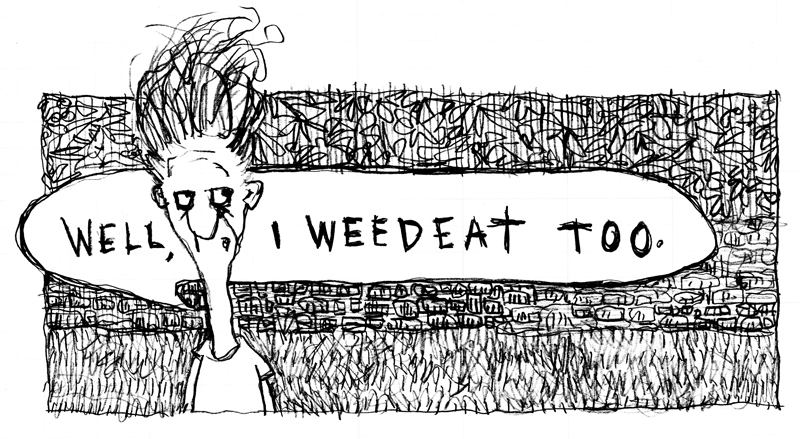
She said, “Come here.”
She climbed up the rock steps wedged into the hillside past a flat spot held in place by a low stone wall, could have been a garden spot was it not all growed up. She took me to another stone wall on the far side of the flat spot. The second wall was higher than the first, made of round stone, creek rock looked like. The old woman stopped short and I about run into her. She clamped down on my shirt sleeve, made me feel like a field mouse a bird had snatched up out of a field, said, “You see them hydrangeas?”
I looked to where her thumb was jerking and I said, “Yeah.”
She said, “Anything happen to them hydrangeas I’ll murder you.”
I said, “Did you plant them or something?”
She looked at me hard and flat as pavement, said, “Look at them.”
They was four hydrangea bushes stretched out towards the kudzu that had took over the hillside behind That Woman’s house. Cora said again, “Look at them.”
I reckon what she was wanting me to look at was the wads of flowers, full and blue, but blue and purple at once, and the way they was shaded under a big oak made the flowers look like something you’d see under the ocean on one of them coral reefs like I seen on this fancy TV in this motel one time in Newport when Sister and her husband took us to see the Cincinnati Reds play baseball. That coral reef on television was something. I’d never seen a TV that bright and clear. I’d never seen a coral reef neither and I couldn’t believe how all them bright colors was waving in the blue water, and how bright and striped and spotted the fish were, and how all that bright actually helped them hide amongst that coral. I wanted to understand it more, but Sister’s husband flipped the channel to try and find the UK football game.
That old woman said, “You got it?” I said I did and she said, “Well then, come over here.” She darted off behind a snowball bush on the other side of the yard where there wadn’t hardly no room to go.
I followed in after her, through the gap between a dogwood and the snowball bush. We come to the far side of the house. I stepped back so the air condition perched up there in an upstairs window, dripping like a Fourth of July ice cream cone, wouldn’t drip on me.
That old woman had a walking stick painted with spots and stripes like one of them coral reef fish. She tapped it beside me on the pavement, then she tapped me with it on my shins, said, “All that vine has got to go,” and waved her stick from the back end of the house to the front. They was vine all over a trellis by the front porch and they was vine running up the electric meter and they was vine running up on the satellite cables and they was vine running up the power line feeding the air condition. At the base of the house, they was junk bushes, all thick and tangly with vine, out of which all the rest of that vine was spewing like some vine volcano.
I said to that old woman, “That’s a mess of vine.”
She said, “We need rid of it. Can you handle it?”
I looked back over the whole thing, believing I could, and when I threw back my head, they was a woman standing at the very peak of the roof. I couldn’t make out much about her because the sun was behind her head, but I could hear a bird chirping and it was like a morning bird, a bird that had forgotten to wake up, which couldn’t be cause birds don’t never forget to wake up.
That old woman hollered, “Patricia!” and it startled the woman against the sky and she threw her arms out to balance herself. The roof woman seemed thin and light, seemed they wadn’t nothing but the center nub to her, which could have just been the trick of the sunshine. She wobbled up there, one foot on either side of the peak, and she was facing right straight out over us. She fell down on her knees, hanging on with both hands to the lip of the roof, looked down at us, said, “Smile, Momma. Don’t be so sour.”
DAWN
The upstairs of Momma’s house wadn’t no better than the down below. The air conditioner in the window above the stair landing roared like people on Fox News. All the other windows swung open on their hinges, waved in the breeze like drunk beauty queens in a bad dream parade. A bird flew around Momma’s bedroom, pooped on the bed when I tried to chase it out, bashed his head against the wall, finally flung himself out into the glare. One wall was half-painted green. Another half-painted gray. The colors were pretty, but they were only half-colors. There was a mattress on the floor, ashtrays on either side, a knocked-over lamp, scattered clothes—some sparkly, some tie-dyed—little clothes, way littler than mine.
Out the window, Canard rolled out to the pointy-headed mountain at the other end of town. The town looked pretty laid out there in the valley. Things had been too jacked up in Canard for too long for anybody to have enough money to ruin its old-timey look. I wondered about the man who built this house, back in the 1920s. I wondered did he think Canard would go on forever. I wondered did he care if it went on beyond the setting sun, did he care deeper than the money in his pockets.
There was a clatter on the roof and then Momma come around the corner, walking on the mostly flat spot that covered the porch right outside her bedroom window. Momma swept the shingle grit off herself. The knobs of her elbows and wrists were scraped. Her hair rustled like willow branches in the breeze. She pulled a cigarette out of her pocket and lit it before she seen me.
When she did, she said, “What are you doing?” like she always did.
I said, “Come to wish you a happy birthday.”
She said, “It aint my birthday.”
I said, “I know it aint.”
Momma turned to stare at me.
I said, “Why you on the roof?”
She said, “Come out here.”
I said, “I aint.” My whole life felt like I was a bug crawling inside a coiled-up garden hose—smaller and smaller circles, slick-dark and rubber-smelling, the only hope of escape something likely to drown you as save you.
Momma raised her voice, said, “Come out here, Dawn.”
I said, “I’m a mother now, Momma.”
“Well,” she said, “Who aint?”
The wind quit and Momma said, “Hubert’s mad at me.”
“How’s he mad at you?” I said. “I thought he was in jail.”
Momma said, “Come out here with me, Dawn.”
She turned from me, not too fast, not too slow. She didn’t talk in a hurry. She seemed to be at normal speed, said, “Who’s that with Cora?”
She didn’t seem excited, didn’t get all tangled up on her words, seemed to be saying what she meant to say. She didn’t seem high. But I didn’t know about high, didn’t know about them pain pills. I didn’t know what they did to you.
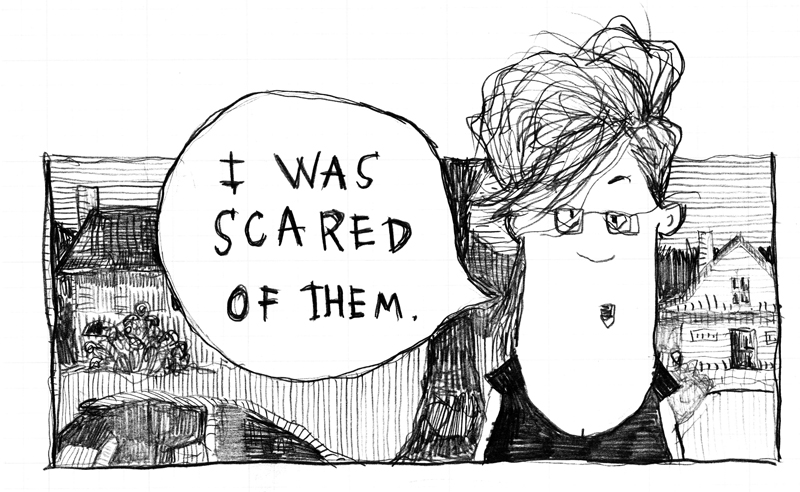
I knew Momma and Evie lived for them. Knew my brother Albert, my uncle Hubert, and a bunch of others sold them.
Pills were easier to stay away from in Tennessee. So was crazy. Easier married to Willett Bilson and his momma’s houseful of fragile things, her house full of quiet sleep.
I pulled up the window screen and stepped onto the radiator under the window. Swung my leg out and straddled the window frame. Momma stood at the roof’s edge with the loose siding and shingle scraps. Her shoulder blades come up out of her tank top like the oars of a boat, my name tattooed between them in cursive where she’d never see it. I got through the window and onto the roof without falling, but it was not a smooth exit. I am not a fireman nor a ballerina. I am big. I am an ox.
My mother sat down, her toes hanging over the gutter. She turned and looked at me over her shoulder, one leg straightened out, its foot out in the air. She patted the spot next to her with her cigarette hand.
I didn’t know to sit there or not. Smothery heat didn’t help me think. Two downpipes ran across the roof on either side of the window, framing the space where Momma sat. I guessed the shingles hot and sticky.
I said, “How can you sit on that?”
“Used to it,” Momma said.
“Momma,” I said. “Are you high?”
Momma didn’t turn around. She said, “No.”
I said, “We seen a wreck on the Caneville Road.”
Momma said, “Anybody die?”
I said, “Probably.”
Smoke came out in a cloud over Momma’s head. She said, “So June’s down there?”
I said, “Yeah,” pushed the window closed behind me and sat down with my back against the wall. The shingles weren’t so hot as I thought. I said, “You OK with that?”
Momma said, “With what?”
“With June coming back.”
“Got to be,” Momma said. Another cloud of smoke bloomed off her head. “I miss that tree,” Momma said.
There had been a red oak in the front yard, big enough to have branches you could touch from where Momma sat, big enough that me and Momma could only barely touch fingers when we hugged it from opposite sides. Last time June had got busy saving Momma, she had had a man trim some limbs off the oak hung out over the street. Big storm a week later knocked the whole thing over. Bad roots, the guy from extension said. Thing blocked traffic, lay there a month across Momma’s yard, right across the steps into Glenda’s yard next door, before Mamaw got somebody to cut it up.
One old lady in the projects down the hill across the road from where the tree trunk lay went and lived with her daughter in Corbin waiting for that tree to get gone. She was afraid the trunk was going to get loose, roll across the road and explode the illegal propane tanks between Momma’s house and her apartment. Blow her to Kingdom Come. I don’t blame her. Who can you count on to do anything right? Thirteen pickup trucks of cut wood come out of that tree.
I said, “Lot hotter out here without that tree.”
“Seems like,” Momma said.
Down below Mamaw lined out more chores for Gene. Her voice was like radio static. Momma peered over. “Who’s that guy?” Momma said.
“Some guy June picked up,” I said.
Momma turned to look at me, her eyebrows riding up her forehead. “Do what?” Momma said.
“Hitchhiking,” I said.
“Oh,” Momma said.
“There she is up there,” I heard Mamaw say. “Not the sense God gave a goose.”
Momma said quiet and tough, “Geese are smart.”
I said, “And they honk a lot.”
Momma laughed, said, “Hubert’s out.”
I said, “Is he reformed?”
Momma sat quiet. “No doubt,” she said with another puff of smoke.
“Why’d they arrest him?” I said.
“Who knows?” Momma said.
“You do,” I should have said out loud instead of just thinking, but I’d been knowing a good while no point asking Momma for something she hadn’t already give you.
The bedroom window pushed open. June stood there holding Nicolette back from climbing out there with us. “Hey, yall,” June said. Momma snapped a look over her shoulder, turned back to the sky, pushed out another cloud of smoke.
How cold Momma was made me hurt for Nicolette. Nicolette stood at the window, watched her grandmother like she was a biting dog or a flower she’d been told not to pick. I stood up, reached to Nicolette through the window. She put her hand in mine. Her hand was sticky and buzzed with energy, a beehive hand.
June said, “I’m taking her over to see Houston.”
I squeezed Nicolette’s hand. “You like that, honeypot?”
“I ain’t no honeypot,” Nicolette said.
She let me put my hand on her hair. I curled my fingers over her ear. I lay my hand against her cheek, and that was too much. She knocked the hand down, said, “Momma Trish.”
My mother turned around. “Hey, baby,” she said. “You going to see your papaw?”
Nicolette said, “You can come too.”
Momma said, “I can’t today, baby. You hug that old goat for me. All right?”
“Yeah,” Nicolette said.
June put her hand on Nicolette’s shoulder. Our eyes met and June said, “We’ll be back.”
I nodded. They left. My mother lit another cigarette. In my mind, my mother’s coal truck heart t-boned mine, a dreadful crash on an empty stretch of road, all shattered glass and twisted metal, no law, no ambulance in sight.
I climbed back through the window, set on the stairs, air conditioner roaring, crying like an idiot,
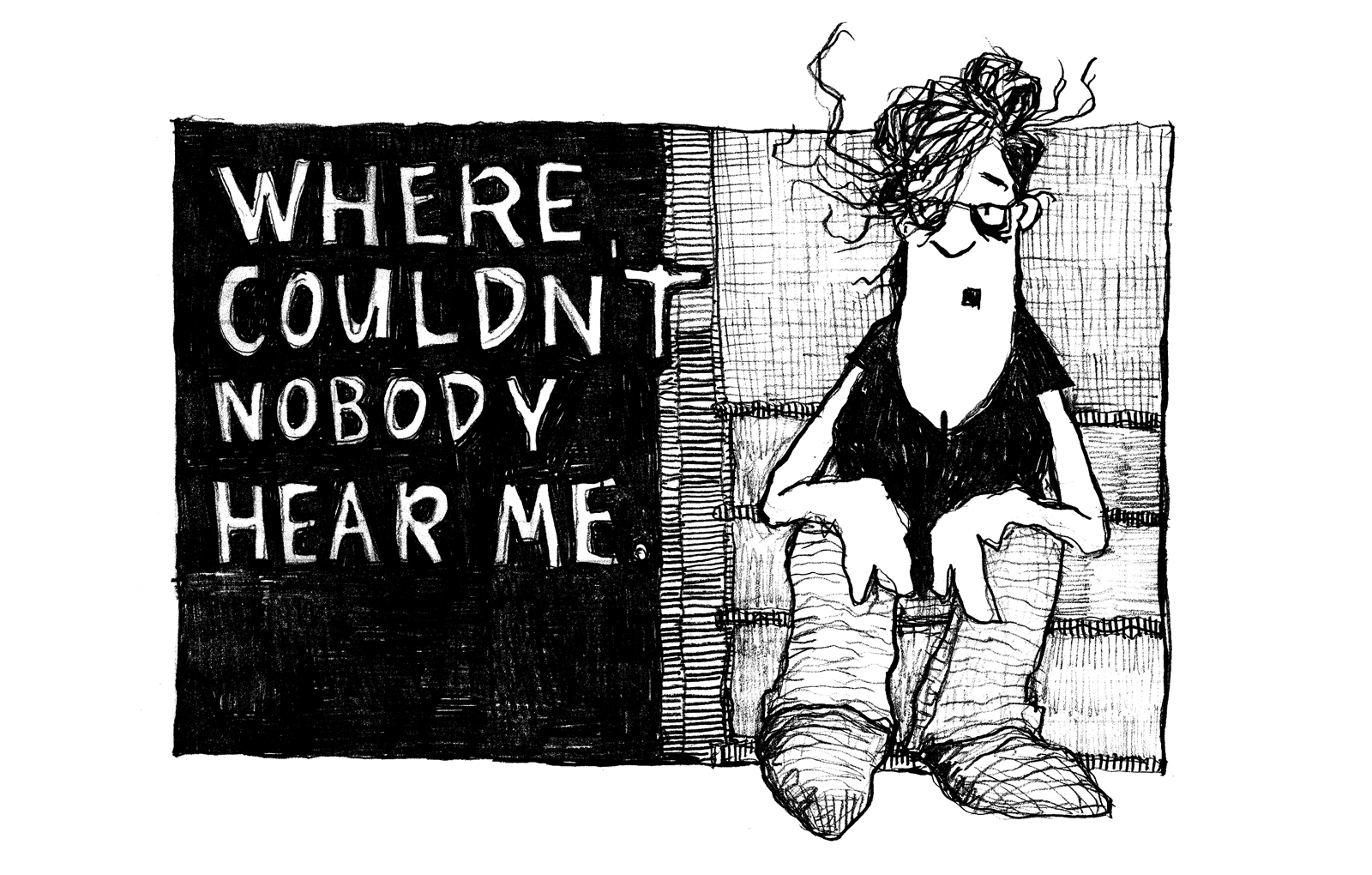
This story first appeared in the 21c Fiction issue (vol. 22, no. 3: Fall 2016).
“Dreadful Crash” is the first chapter from Robert Gipe’s forthcoming book Weedeater. Gipe grew up in Kingsport, Tennessee. He is the producer of the Higher Ground Community performance project and director of the Appalachian Program at Southeast Kentucky Community & Technical College in Harlan, Kentucky. He lives in Harlan, Kentucky.


